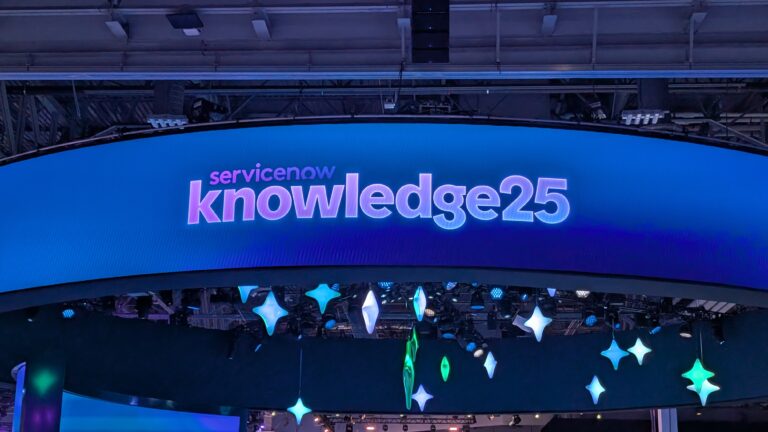ServiceNow’s Knowledge 25 event in Las Vegas was bigger than ever, and in this Techzine Perspective we’re here to break down the key takeaways from this year’s conference. From bold moves in the CRM market to groundbreaking AI innovations, ServiceNow is making significant strides.
For people who still see ServiceNow as an ITSM provider, it’s time to wake up. Those comparisons are old and the same as saying Oracle is just a database company, Salesforce just does CRM, and IBM is still only working on its mainframes. They all do a lot more, but ServiceNow was always a bit hard to understand because it focused on being a workflow platform company. Now they are better positioning themselves with end products that resonate much better.
ServiceNow takes on Salesforce: CRM is the keyword
One of the most significant announcements was ServiceNow’s aggressive push into the CRM market, directly challenging the dominance of Salesforce. While ServiceNow executives carefully avoided explicitly naming Salesforce as a competitor, the implications were clear. As we mentioned in our earlier analysis on Techzine.eu, ServiceNow’s strategy focuses on leveraging its existing strengths in service management to carve out a niche in the CRM space. While they acknowledge Salesforce’s marketing prowess as a significant advantage, ServiceNow’s acquisition of a CPQ vendor signals a determined effort to bolster its sales capabilities. The key takeaway? ServiceNow isn’t just dipping its toes in; they’re diving headfirst into a competitive market.
AI Control Tower can be a game-changer in AI management
ServiceNow unveiled its innovative AI Control Tower, a platform designed to manage and govern AI agents, LLMs, and workflows across various platforms. This unique offering provides crucial security, compliance, and governance features that are currently lacking in the market. We had the opportunity to discuss this technology in detail with ServiceNow co-founder Pat Casey, who emphasized the importance of API access to agent platforms for customers and developers, highlighting the preference for code-based interaction among developers. These API’s also allow the AI Control Tower to manage AI agents on other platforms.
While the concept is compelling, the practical implementation faces challenges. There is a need for deeper integration between all the different platforms. Casey would love to see more log information about how AI agents operate on other platforms. That data can be very useful for the AI Control Tower to analyse and take action. Think of configuration changes in environments and security complexities; these all require closer collaboration between the different vendors.
ServiceNow is actively addressing these hurdles, and they are talking to many partners and competitors about sharing information to better monitor AI agents. The AI Control Tower can already use AI to monitor compliance, detect malicious prompt injection, and block the use of unwanted models. While many other features are still under development, the potential of this technology is undeniable, and further announcements are expected in the coming months. ServiceNow also sees MCP and the agent-to-agent protocol as significant steps forward because there is a need for industry-wide collaboration to avoid fragmented AI standards.
Expanding horizons: the core business suite for the mid-market
ServiceNow isn’t just focusing on enterprise clients. They’re also launching a core business suite specifically tailored for mid-market organizations. They are initially targeting companies with 1000-5000 employees, but that’s almost impossible in Europe, we expect expansion to smaller businesses in Europe as well. This bundled solution aims to simplify adoption, with claims of implementation taking only a couple of weeks using an AI wizard.
Also read: ServiceNow goes after the mid-market with its AI-based Core Business Suite
The future is your own personalized AI assistant
ServiceNow’s research team is pushing the boundaries of AI, developing high-performing, small reasoning models in collaboration with Nvidia. Their vision? Dedicated 24/7 personal AI assistants. While the concept isn’t entirely new, the rapid pace of development and the demos already running suggest that these personalized AI assistants may be closer to reality than we think. Competitors like Anthropic, OpenAI, Microsoft, and Google are likely pursuing similar concepts, promising a wave of next-generation AI agents later this year.
Conclusion: ServiceNow’s evolving landscape
ServiceNow is evolving, expanding its offerings, and solidifying its position as a key player in the technology landscape. From its ambitious CRM strategy and groundbreaking AI Agent Control Tower to its new core business suite for the mid-market, ServiceNow demonstrates a clear vision for the future of work.
